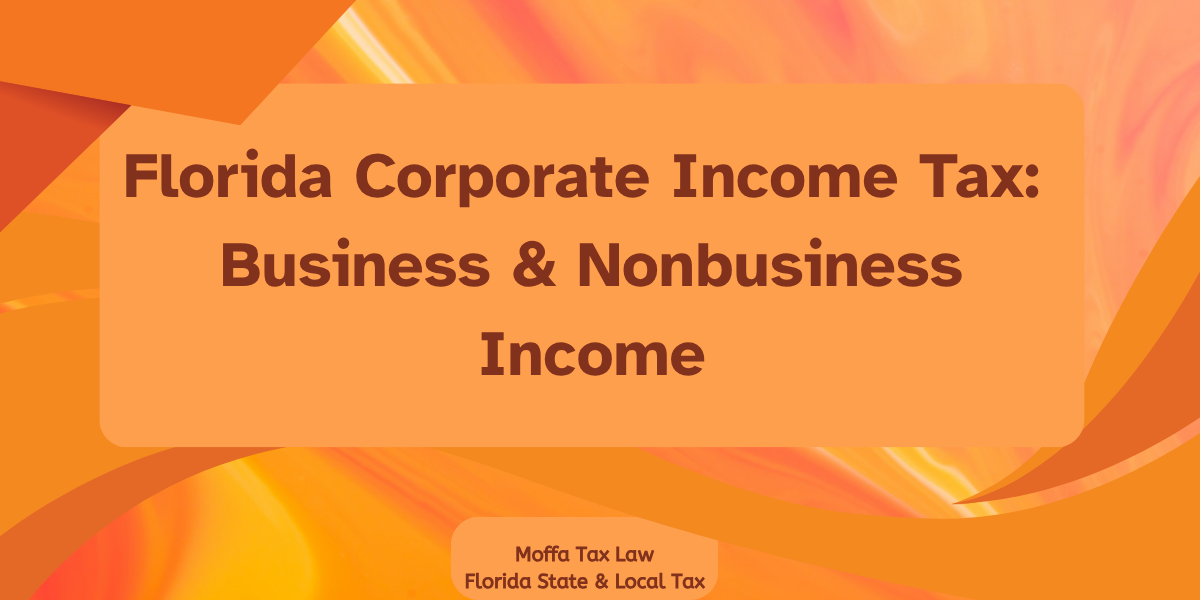NEWS & INSIGHTS


Business vs. Nonbusiness Income in Florida Corporate Tax: A Line More Rigid Than You Think
For multistate corporations navigating Florida’s corporate income tax rules, the difference between business and nonbusiness income isn’t just theoretical—it can determine whether income is subject to apportionment, which state gets to tax it, and whether key receipts are included in the sales factor.
While many states have blurred the boundaries between business and nonbusiness income, Florida draws that line sharply, through both its statutory language and its administrative rules. Two recent cases—OptumRx and Honda—show how Florida continues to enforce a highly structured, conservative interpretation. And when compared to cases like Microsoft’s successful refund in California, it’s clear Florida plays by a different rulebook.
Florida’s Statutory Framework: Business Income by Exclusion
Florida does not define “business income” directly. Instead, it defines nonbusiness income in § 220.03(1)(r), Fla. Stat.:
“Nonbusiness income” means rents and royalties from real or tangible personal property, capital gains, interest, dividends, and patent and copyright royalties, to the extent that they do not arise from transactions and activities in the regular course of the taxpayer’s trade or business.
The term does not include income from tangible and intangible property if the acquisition, management, and disposition of the property constitute integral parts of the taxpayer’s regular trade or business operations…
Functionally related dividends are presumed to be business income.
This structure incorporates both the transactional test and the functional test, although Florida does not name them. Both are regularly applied in audits and litigation.
Administrative Overlay: Not All Business Income Affects Apportionment
Florida further limits apportionment through Rule 12C-1.0155(1)(f)2, which excludes certain types of intangible income from the sales factor:
Where business income in the form of dividends… results from the mere holding of the intangible personal property by the taxpayer, such dividends… shall be excluded from the denominator of the sales factor.
Even if income is business income, it must still pass this test to be included in apportionment calculations.
OptumRx: Rebates and Sourcing in Dispute
In OptumRx, Inc. v. Florida Department of Revenue (2025 CA 000188), the taxpayer argues that pharmaceutical rebates are part of its PBM services and should be included in the sales factor. It also claims that most of its services are performed outside Florida under the cost-of-performance rule.
The Department disagrees, asserting that:
- Rebates are not sales receipts and should be excluded from the sales factor.
- The rebates stem from passive activity, not Florida operations.
- The services should be sourced based on where benefits are delivered—i.e., Florida patients.
Honda: Dismissed Before Decision, But Clear Positions
In American Honda Motor Co., Inc. v. Florida Department of Revenue (2022 CA 000222), Honda attempted to exclude proceeds from the sale of GHG and CAFE credits as nonbusiness income, arguing the credits were incidental and not part of its regular business operations.
The Department countered that:
- The credits were generated through core vehicle sales.
- They were functionally integrated into Honda’s business model.
- They should be included in the sales factor.
Honda filed a notice of voluntary dismissal, and the court never ruled on the matter. Still, the pleadings show how the Department frames income as apportionable under both statutory and rule-based logic.
The California Contrast: Microsoft’s Refund Wouldn’t Fly Here
In 2024, Microsoft successfully argued in California that foreign dividends were business income and should be included in the sales factor denominator. The state’s Office of Tax Appeals agreed, resulting in a refund exceeding $100 million.
In Florida, that outcome would be unlikely. Even if the dividends were business income, Florida’s Rule 12C-1.0155(1)(f)2 would likely exclude them as resulting from passive investment. Microsoft’s victory in California underscores how strict Florida’s structure truly is.
Conclusion: Florida’s Boundary Is Built to Withstand Litigation
Florida applies a layered and restrictive approach to business income:
- Statutory classification under § 220.03(1)(r).
- Rule-based exclusions that limit inclusion in the sales factor.
Cases like OptumRx and Honda show how aggressively the state applies this structure. And compared to jurisdictions like California, where refund claims like Microsoft’s are possible, Florida’s tax law is far less forgiving.
Moffa Tax Law | Florida State and Local Tax Attorneys
© 2025 Jeanette Moffa. All Rights Reserved.
Nonbusiness income in Florida includes interest, dividends, capital gains, and royalties that do not arise from the regular course of a taxpayer’s trade or business.
Florida uses two tests embedded in statute: the transactional test (based on business activity) and the functional test (based on whether the asset is integral to business operations).
This rule governs whether income from intangible property like dividends and interest is included in the sales factor. Passive income is typically excluded.
Only if the dividends come from active business use of the intangible asset. Passive dividends are excluded under Rule 12C-1.0155(1)(f)2.
OptumRx is currently litigating whether its manufacturer rebates are part of gross receipts and whether its PBM services are sourced correctly under Florida’s rules.
Honda challenged the inclusion of GHG and CAFE credit income as apportionable business income. The case was voluntarily dismissed before a decision.
Probably not. Florida likely would have excluded the dividends from the sales factor due to its passive nature, even if they were business income.
Florida law uses cost-of-performance, but the Department has interpreted it in ways that resemble market-based sourcing, especially for services.
Yes. They are presumed to be business income under § 220.03(1)(r), but must still meet sales factor inclusion criteria.
Florida combines strict statutory definitions with detailed rules that limit what counts as apportionable income and what can be included in the sales factor.
Share
Additional Articles by the SALTy Orange at Moffa Tax Law:
NEWS & INSIGHTS Inside the FTA’s May 2025 Committee Report: What State Tax Officials Are Watching Inside the FTA’s May…
NEWS & INSIGHTS State Conformity with the BBA Partnership Audit Rules: Where Are We in 2025? State Conformity with the…
How Florida’s Sales Tax Auditors Target Convenience Stores (and What You Can Do About It)”
NEWS & INSIGHTS How Florida’s Sales Tax Auditors Target Convenience Stores (and What You Can Do About It) Florida Department…

Jeanette Moffa, Esq.
(954) 800-4138
JeanetteMoffa@MoffaTaxLaw.com
Jeanette Moffa is a Partner in the Fort Lauderdale office of Moffa, Sutton, & Donnini. She focuses her practice in Florida state and local tax. Jeanette provides SALT planning and consulting as part of her practice, addressing issues such as nexus and taxability, including exemptions, inclusions, and exclusions of transactions from the tax base. In addition, she handles tax controversy, working with state and local agencies in resolution of assessment and refund cases. She also litigates state and local tax and administrative law issues.


